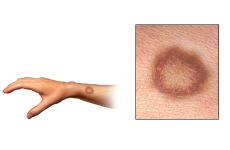Wrestlers, staff work to prevent spread of infectious diseases

February 14, 2007
The nature of the sport of wrestling is such that it is a breeding ground for infectious skin diseases. Any untreated infections have the potential to spread like wildfire through an entire team, or in extreme cases, an entire state. Because of these risks, the Simpson wrestling team takes several precautions to prevent the spread of disease.
The most common types of infectious skin diseases in wrestling are impetigo (known as staph), fungi (such as ringworm and athlete’s foot), and herpes simplex. If both the wrestling team and the training staff take proper measures, these diseases can be prevented from spreading.
“We talk to our kids every day and if they think there is anything suspicious we make sure that they let us know,” said Ron Peterson, head wrestling coach and assistant athletic director. “We scrub our mats everyday with disinfectants that are recommended by the National Wrestling Coaches Association.”
Herpes simplex has been receiving coverage in the media lately. Earlier this season, the state of Minnesota cancelled all high school wrestling meets for an eight-day period after 24 clinically confirmed cases of herpes were detected. There was also another outbreak that occurred a little closer to home.
“The University of Dubuque had a period where they had herpes and staph and had to shut their wrestling room down for a week and couldn’t compete in the national duals because of it,” said Peterson.
Simpson has had a few cases of herpes this year, but nothing as serious as the outbreaks in Minnesota or the University of Dubuque. No Simpson wrestlers have had to miss a meet because of an infection.
“Throughout the year, here and there we have had an occasional case,” Head Athletic Trainer Jason Uhlenhake said.
It is important to note that the herpes being referred to is a different form of herpes than the STD. More than likely, most people have had an unpleasant experience with herpes at some point in their lives.
“Almost everybody has had chicken pox, so almost everybody has had herpes, it’s just a matter of it manifesting itself,” said Mike Hadden, program director of athletic training and exercise science. “Herpes Simplex will usually manifest itself as a cold sore or something on the face.”
A sure sign of herpes is when lesions begin to form in clusters on the face. When that happens, there are several steps a wrestler must take before re-entering competition, including a signed document from a physician permitting them to wrestle.
“The NCAA requires that if someone is diagnosed with herpes, they have to go on an anti-viral for 48 hours, the lesion has to show significant drying and there must be no new lesions for 48 hours,” Hadden said. “If someone has herpes they can’t come in contact with another wrestler for that time.”
Herpes rarely has any severe side effects and is more of a nuisance than anything else.
“The big thing with herpes is that it isn’t life threatening or severe, other than the fact that you carry it forever,” Uhlenhake said. “It can cause blindness in severe cases if it gets into the eyes.”
Herpes and other infectious skin diseases are difficult to prevent and, as Uhlenhake mentioned, once someone is a carrier, they are for life. The key to avoid the spread of herpes is to take proper measures when someone does show signs of a flare-up.
“I’m pretty conservative when it comes to anyone who has a skin disease,” Peterson said. “I don’t want them in my wrestling room.”





